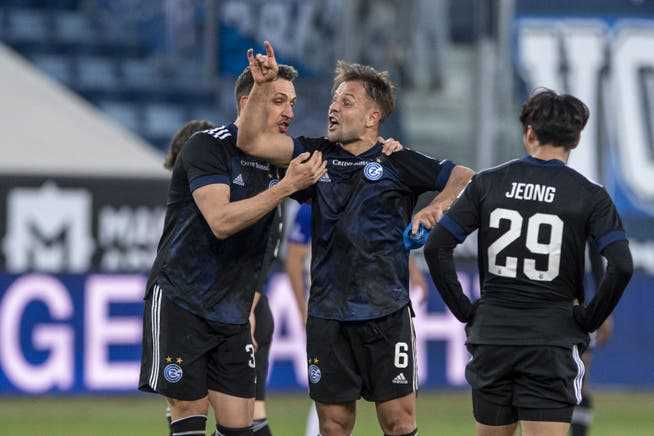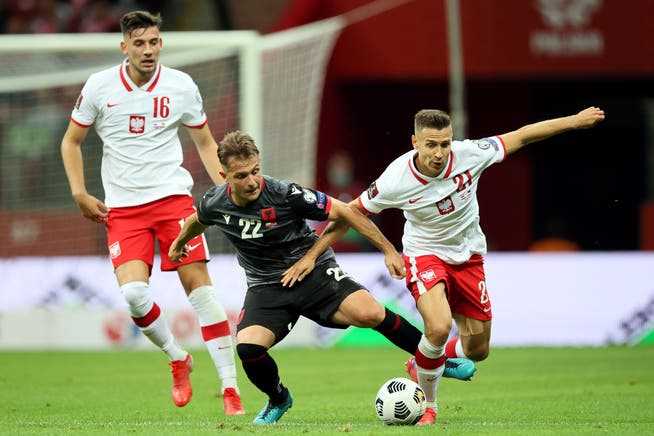Amir Abrashi returned to Grasshoppers last summer. He is a role model and aggressive leader of the team. Before the GC home game against Basel, his former teammate Kay Voser says: “Sometimes Amir takes on too much.”
“If I can mill fully, I’m in my element,” says GC Captain Amir Abrashi (right).
Amir Abrashi’s departure last Sunday is a spectacle. GC lost 0:1 at FC Luzern, for Abrashi the event is not over. Like a Rumpelstiltskin, he rages on the lawn, messes with opponents, loudly tells the referees his opinion, has to be held back by teammates, and to the amusement of the audience on the way to the dressing room, he even bullies in the direction of the stands. He cannot be reassured.
A few minutes later, he’s standing alone at the front of the fence with the frustrated Grasshoppers supporters, talking urgently to them while the other GC players are a few yards back. Abrashi is the pacifier now, the fans like him, he’s one of them, one with a big heart for the Grasshopper club. Later he talks to the journalists, still outraged. He says: “We’re not going down. And we want our fans to have nice weekends again.”
GC and Abrashi are pretty far away from nice weekends, after a series of defeats there is a risk of a relegation battle. And maybe Amir Abrashi has to fill too many roles, the outbreak in Lucerne was a symbol of this. He’s supposed to be the lead player and the aggressive leader, he’s the captain of the team and a face of the club.

In the last match in Lucerne, Abrashi could hardly calm down, the crisis in his GC team was so preoccupying for him.
Perhaps Abrashi can’t help but accept this challenge; now, towards the end of a career that he has pursued energetically, ambitiously and with complete dedication. “Even as a young player, he was very demanding, willing to learn, direct,” says Kay Voser. “He asked a lot of questions and wanted to improve in every training session.”
The father was shot
Voser was a regular at GC when Abrashi was brought to Grasshoppers by coach Ciriaco Sforza from Winterthur in 2010. After a few weeks, the play-off second leg of the Europa League against Steaua Bucharest was coming up, Abrashi had come on for Ricardo Cabanas – and took penalties as a 19-year-old. Abrashi scored but the Grasshoppers were eliminated. “Amir was always characterized by this irrepressible passion, he led the way,” says Voser, who now works as an expert at Swiss television and studies psychology and sociology in Freiburg.
Abrashi was early seen as a terrier who runs and straddles and says he never takes it easy on himself or his opponents. “If I can mill all the way in,” he says, “I’m in my element.” Perhaps the 1m 72 tall central midfielder is too often reduced to being a fighter, because he also knows what to do with the ball and combines strategic thinking with fearlessness.
He stayed at GC for five years, in 2013 the Zurich team won the cup final against FC Basel, it was the last title in the club’s history. And now Abrashi wants to lead the Grasshoppers to their former glory, and he takes every defeat personally. “I knew what I was getting into, it’s going to be a long road. But I hate it when we lose, »says Abrashi. “After the Lucerne game, I was down for 48 hours.”
Until GC’s return last summer, Abrashi never had to assume a managerial role. At Grasshoppers, Boris Smiljanic, Veroljub Salatic, Ricardo Cabanas and Milan Vilotic were the leaders, at SC Freiburg he was a valued worker for six years and was mostly injured during his loan commitment to FC Basel last spring. “Sometimes Amir takes on too much,” says Kay Voser, “that has to do with his personality. He always demanded a lot from himself and his teammates.”
Even in the Bundesliga. Klemens Hartenbach, sports director at SC Freiburg since 2013, says Abrashi was a SC model player with his mentality. And the Freiburg coach Christian Streich once said: “Amir is a fighter in the Lord, a great person who is always at the service of the team. He had to overcome a lot of resistance.”
98 competitive games, four goals, always 100% commitment! ? Amir #abrashi leaves the #SCF and joins it #gc_zurich at. We will miss you Amir!
All information: https://t.co/jwSb0EGZFF pic.twitter.com/peY80TPXWs— SC Freiburg (@scfreiburg) June 23, 2021
Abrashi tore a cruciate ligament twice, in his left knee in 2011 and in his right knee in Freiburg seven years later. And then there is the past. Abrashi’s father was shot by Serbs during a demonstration in Kosovo, another man died, Abrashi’s father survived with severe wounds on one leg and chest, was brought to Switzerland by his brother and still has a bad limp today. Amir Abrashi grew up in Bischofszell with three sisters, the parents insisted that he finish the four-year plant engineering apprenticeship in Winterthur.
Great praise from the popular Bundesliga coach Streich
With his socially critical, rousing statements, Christian Streich is a moral compass in the Bundesliga. When he says Abrashi is an outstanding personality and will always be in his heart, it sounds like an honor. In 2015, Abrashi even managed to get the coach back on his feet one day after SC Freiburg were relegated from the top German league.
Klemens Hartenbach tells how Streich met Abrashi at a motorway service station in Switzerland on his way to Italy on vacation. “We had observed Amir for a long time,” says Hartenbach. “After the meeting, Christian called me enthusiastically and said he had rarely seen such a positive person.” Abrashi, on the other hand, says that Streich inspired him a lot. He would later like to work as a trainer himself, he has acquired his first diplomas.
Abrashi stayed in Freiburg for five and a half years, played 98 competitive games, 60 of them in the Bundesliga, but he was also injured more often. In 2018 he was absent for almost the entire year due to a cruciate ligament rupture. “There were Amir games in which he was particularly valuable because he carried the others away with his willingness,” says Hartenbach. “He threw himself into every duel.”

“Terrier” Abrashi throws himself in the jersey of SC Freiburg in a duel with Serge Gnabry from FC Bayern Munich.
Abrashi suspects that he has missed a game or two because he never plays with the handbrake. And Kay Voser says that after several injuries, he was never able to perform with the vibrancy that characterized him when he was younger, which is why he ended his career relatively early.
Abrashi has been absent several times this season due to injuries, his body is suffering. On Sunday in Lucerne, he was a little reminiscent of Blerim Dzemaili a year ago, when he wanted and had to do too much in a troubled team after returning to FC Zurich. Like Dzemaili, Abrashi is a role model. He says several times that it’s all about “blue and white” – and the rival’s success is an incentive and shows how fast things can go in football. “A year ago, the FCZ was still in the relegation battle.”
A life for football
Abrashi was at his strongest when he was a supplier and able to focus on his game. He has made almost 50 appearances in Swiss youth teams and is good friends with Xherdan Shaqiri and other national players of his generation. The Swiss national coach at the time, Ottmar Hitzfeld, dealt with him but never called him up. Abrashi has now won 44 caps for Albania, sometimes captaining the selection.
In the confusing GC construct with influences from China, England, Portugal, Abrashi is the footballer who is there with his heart and soul. He will be 32 at the end of March and says he still has a few good years left. He treats his body to special treatments every day: massages, ice baths, oxygen chambers, a life dedicated to football. He’s a communicative, open-minded guy, he can get really upset about the young players, who too often live in a make-believe world and spend too much time on Instagram and things like that. “We have to do everything we can every minute to be successful.”
He didn’t always manage to do that this season either. GC had the best phase in the fall when Abrashi was injured. He recently had to be substituted after 32 minutes in St. Gallen because he was about to see his second yellow card. “We know Amir,” says his coach Giorgio Contini. “He is always fully committed. And if he’s as upset as he was in Lucerne, it’s because he wasn’t happy with our performance.”
Abrashi is smart enough to point out the positives when asked if he also finds certain things going on at GC irritating. He says that without the Chinese investors, the club would no longer exist in these complicated Corona times. And the many young, foreign players are talented, but it takes time to integrate them, he wants to set an example.
Next time on Sunday against FC Basel. It’s an Amir game, anything can happen.

